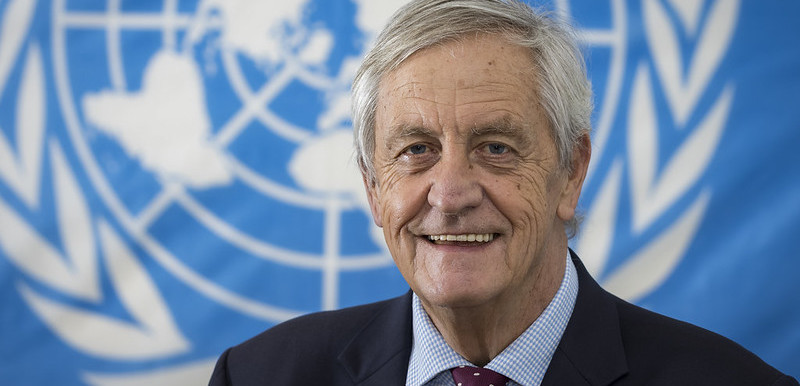The UN Secretary-General’s Special Representative (SRSG) for South Sudan, Nicholas Haysom, on Monday, while briefing the UN Security Council, said that South Sudan has made some progress but that the overall implementation of the revitalized agreement is progressing slowly.
“I am pleased to report some progress in the implementation of the revitalized peace agreement since our last report in March. Allow me to highlight three notable achievements. First, on 10 May, the revitalized government established a task force to oversee and coordinate transitional justice and other judicial reforms,” Haysom, reported. “Second, on 11 May, President Salva Kiir reconstituted the national legislature and appointed 550 new members to that legislative. This too was a distinct step forward. Third, on 25 May, President Kiir, with Sudan’s Prime Minister Abdalla Hamdok in attendance, officially launched the permanent constitution-making process in Juba.”
The SRSG said drafting a national constitution is a quintessential act of sovereignty and expresses the highest aspirations of a nation and its most cherished values. He said an inclusive national conversation will lay a foundation for a social contract between the citizens of the country and an engaged and inclusive process will increase the probability of a durable peace.
Haysom, who is also the UNMISS chief, however, qualified that despite some progress, the overall implementation of the revitalized agreement is progressing slowly.
“Notwithstanding these markers of progress, the overall implementation of the revitalized agreement is progressing slowly. The formation of the legislature remains incomplete. The constitution of the Council of States and the nomination of the legislative assembly speaker are pending. UNMISS continues to encourage the government to continue with these processes while ensuring adequate representation of women and youth at all levels,” he said.
He also pointed out that the Transitional Security Arrangements remain behind schedule and the formation and graduation of the Unified Forces is a critical element of South Sudan’s transition intended to prevent the intractable relapse into conflict.
“Troops continue to suffer in cantonment and training sites without adequate shelter, healthcare, and food. It is therefore important that the precondition of a coherent command and control structure is finalized, followed by the graduation of the Forces,” the SGSR said. “The recent announcement by the Presidency – that’s both the President and the Vice President – in support of rapid implementation of Chapter 2 of the agreement, including expedited graduation of the new Unified Forces, is encouraging. And it is our hope that the commitments so publicly made will be duly delivered on.”
Haysom also reported that intercommunal violence continues to undermine durable and sustainable peace in South Sudan.
“I would like to highlight the pervasive insecurity, in particular intercommunal violence, which continues to obstruct the realization of a durable and sustainable peace in South Sudan. This year, more than 80 percent of civilian casualties were attributed to intercommunal violence and community-based militias,” Haysom said. “UNMISS Force continues to interrogate its own impact – or the impact of its own response to these threats – and its commitment to being a highly mobile force and in a highly mobile posture. Deploying, often preemptively, to conflict hotspots, the UNMISS Force has maintained a presence in strategic areas during the rainy season, enduring extreme weather conditions. These initiatives, among others, have contributed to some reduction in violence compared to the previous year.”
According to the SRSG, the absence of government in most parts of the country enabled insecurity to spiral out of control and hindered farming activities.
“Nevertheless, weak or absent state governance institutions throughout South Sudan have enabled spoilers to exploit perennial communal and ethnic cleavages. Entrenched insecurity has hindered the cultivation of crops and has contributed to a vicious cycle of livestock raiding.” Haysom said. “Many communities are dangerously short of food supplies in places such as Warrap, Lakes, and Jonglei, to name but a few. Meanwhile, in the Equatorias, the National Salvation Front and the South Sudan People’s Defense Forces remain engaged in intermittent armed conflict.”
The SGSR said that weakened rule of law institutions and an economy in free fall have seen amplified criminality and the targeting of humanitarian workers.
“Worryingly, weakened rule of law institutions and economic deterioration has led to increased criminality and targeting of humanitarian workers. This year alone, four humanitarian workers have been killed, and millions of dollars of humanitarian supplies looted or destroyed,” He reported. “The callous and indiscriminate killing of humanitarian workers is deplorable. UNMISS recognizes its own important contribution to creating a safe environment for humanitarian partners. And the Mission will continue to take the lead in promoting and advocating for safe conditions for the delivery of life-saving services.”




